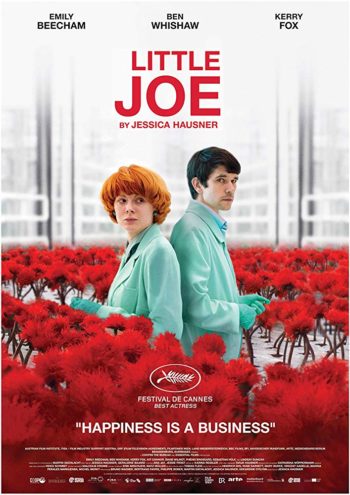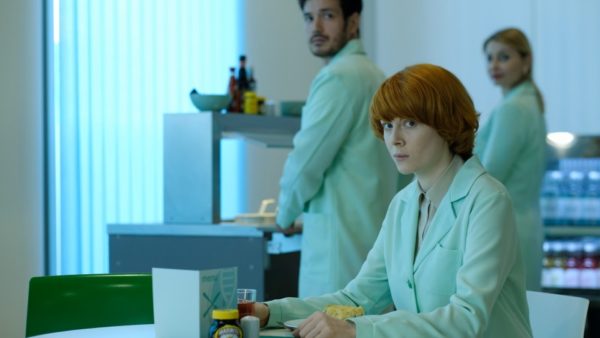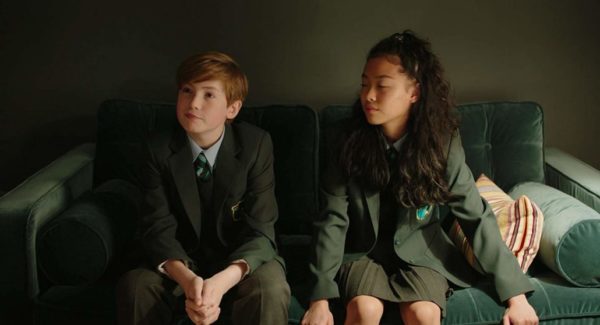Little Joe (2019)
Directed by: Jessica Hausner
Written by: Géraldine Bajard, Jessica Hausner
Starring: Ben Whishaw, Emily Beecham, Kerry Fox, Kit Connor

LITTLE JOE
Directed by Jessica Hausner
Horror has never been known to shy away from tough themes, with recent movies addressing everything from institutionalised racism to schizophrenia and the oppression of the British Empire. The fourth film from Austrian director Jessica Hausner, and her first in English, adds the effects of psychotropic drugs to that list. It’s a horror, sci-fi hybrid that’s thus far proven controversial from the festival circuit for it’s bold but blunt message about pharmaceuticals. But let’s not get ahead of ourselves – first, we should do introductions.
The titular Little Joe, named after his creator’s kid (Connor), is a lab produced plant designed to spread joy via the release of the love hormone oxytocin. Alice (Beecham), the brain behind it, is an emotionally unavailable scientist far more suited to breeding plants than boys. Hence why she keeps her sexually/ intellectually admiring colleague Chris (Wishaw) at a distance. She’s also better at raising plants than children, and spends way more time in the lab than with her under-loved son. Lucky there’s a flower for that and, after accidentally being sprayed, Chris finds a new fixation. Moreover, after she goes against company policy by bringing one of her Joe’s back, its namesake gets all the mothering he needs. However, the sterile Joes aren’t acting out of an altruistic urge to help others, but instinctual self-preservation that sees them taking over those who sniff them to enlist them as an obsessively devoted army of guardians. Think a low-key take on Invasion of the Body Snatchers meets Day of the Triffids on Prozac.

And there’s where the problems come in. Little Joe has much the sort of broad strokes you’d see in something like Black Mirror, with the real world relevancy more sledgehammer than subtext. Only while Black Mirror exaggerated aspects of modern tech to show that the thing viewers assume is a bad idea is a really bad one, Little Joe turns its attention to something close to one in five people in the country has taken: antidepressants. For which the plants provide an obvious stand-in. In itself, this is not necessarily a bad thing. As I said before, horror has a habit of handling tricky topics, and big pharma practices are more than ripe for ridicule. Yet the parallel between “better living through chemistry”, and a dehumanising force that emotionally stunts its victims is uncomfortable and insensitively integrated into a psycho-drama. The more the unthinking followers have of Little Joe the more single-minded they become, faking their emotions with others and manipulating them in greedy pursuit of another high from their favourite pot plant. As a concept for a film, it’s neat – especially given how Joe appears to adopt this strategy as a defence to compensate for being barren. But as commentary, it’s a clumsy attempt to deal with something difficult and lacks the type of nuance or substance the subject necessitates. It’s alright for Black Mirror to mock social media, since even ardent users are aware of its ridiculousness. Although I can’t imagine how people who have experience with antidepressants, which to be fair I haven’t, would align their experiences with this very cynical look at their disorder.

This tactless approach to its themes is frustrating, as Little Joe is otherwise well done. Ironically, it’s maybe as a mood piece that it functions best. Hausner is an amazing director, with a truly excellent eye. Her use of single pastel colours throughout gives the modern day an at times 70’s look and contributes to an eerie, antiseptic atmosphere from the start. Her camera work is fantastic too, with long, steady shots panning along the greenhouse, and other austere interiors, like a security camera. It’s all so cold and clinical. An effect which get enhanced by an intentionally stilted, and often glacial, dialogue and is further aided by the excellent cast’s restrained, and slightly robotic line readings. Scenes like Chris’ unsuccessful flirting, and attempts to initiate physical intimacy with Alice, are painfully awkward and add emotional weight to emotionless material. Although their interactions are ultimately superficial, there’s an irony to how the characters become more passionate, and sometimes full of life, after taking the dulling pollen. The soundtrack also deserves special mention, mimicking the emotions Alice is uncomfortable expressing, even if it becomes overbearing in the third act. For the most part, it’s sparse, with an emphasis on drums (even if it gets overbearing after the pollen hits the fan).

As per everything else in the film, the score leans more towards making scenes unsettling rather than scary. A choice that makes sense since the tension doesn’t come from the plants turning people into monsters, but the gradual spreading of Little Joe’s pollen and the mind-set that proliferates with it. At first it’s undeniably frustrating, and often boring, to watch a very smart character fail to make connections even the stupidest member of the audience will. Thankfully, as the irregularities build, and Alice becomes increasingly paranoid of her colleagues, the film starts to feel effectively oppressive. Hausner sows the seeds well, starting with an out of place smile here, or hint of threat there, and builds to something altogether more sinister. There may be none of the body horrors that you’d expect from the premise and minimal onscreen violence. However, she knows how to do disconcerting, even though her movie ever quite blooms into a fully formed thriller. Still, the understated final scenes are fairly brave, reviving the wilted third act with some choices I never saw coming. Thus, Little Joe is a strange species, that combines the DNA of a tactless morality tale with a decent psycho-drama. Maybe it’s best considered a promising prototype. With some extra love and attention to the script, Hausner’s next could grow into something beautiful.
Rating: 






Be the first to comment